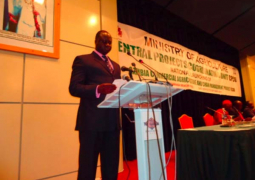The Inter-Governmental Action Group against Money Laundering in West Africa (GIABA) is organising a 3 –day regional sensitization workshop for Civil Society Organisations (CSOs) on Anti-Money Laundering and Counter-Financing of Terrorism (AML/CFT) requirement for ECOWAS member States at the Best Western Hotel, Victoria Island, Lagos, Nigeria, from 24 to 26 August 2015.
The objectives of the workshop are to: (i) actively sensitise members of the civil society to their roles in combating the twin scourges of money laundering and terrorist financing, particularly that of taking the AML/CFT message to the grassroots; (ii) assist participants to advocate policy development on AML/CFT issues; and (iii) strengthen the network of CSOs to mount a holistic and aggressive campaign on AML/CFT.
The fight against money laundering and terrorist financing is a collective responsibility of all stakeholders towards protecting the economies and financial systems of member States from the laundering of proceeds of crime. GIABA recognises the valuable contribution that civil society can make to the public policymaking process and attaches great importance to engagement and partnership with CSOs mobilising political will for AML/CFT. Fundamentally, one of GIABA’s core Strategic Goals since 2011 has been the promotion of strategic partnerships with the private sector, civil society and other key stakeholders. Increasing ML/TF awareness among civil society is crucial to empowering citizens to take appropriate action against ML/TF.
This workshop, which is the third in a series, is a follow-up to similar workshops for Civil Society Organizations held in Dakar, Senegal, and Abidjan, Cote d’Ivoire, in 2012 and 2014 respectively. The workshop will cover the following issues: overview of AML/CFT regimes in West Africa, the role of GIABA as a regional initiative, trends of ML/TF in the region, threats of ML/TF to peace and security in the region, threats of ML/TF to sustainable development and impact on youth employment.
The training will be delivered by technical experts with extensive working experience in the private sector and governmental institutions. A variety of teaching methods will be used, involving lectures, presentation of case studies, group work and sharing sessions.



